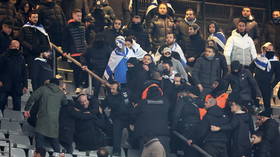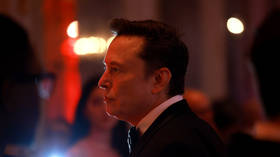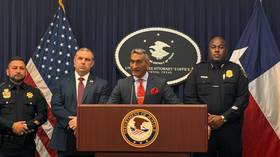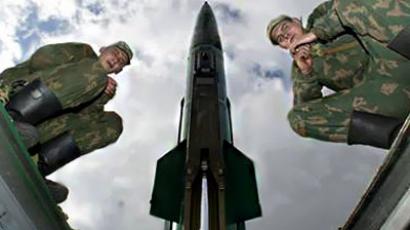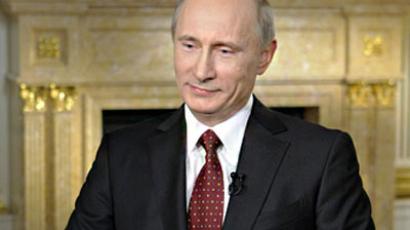NATO and Russia “must stop targeting each other” – Dmitry Rogozin

Russia's Ambassador to NATO has invited the alliance to agree not to draft military plans against each other in light of WikiLeaks revelations.
In an interview with www.gazeta.ru, Russian Ambassador to NATO Dmitry Rogozin commented on the WikiLeaks files that indicate NATO is drafting plans to protect specific Eastern European countries, including Poland, Estonia, Latvia and Lithuania from possible “Russian aggression.”“I believe the best way out of the situation is to start a serious discussion within the Russia-NATO Council on possibly deciding not to target military planning against each other," Rogozin said.Rogozin added that the revealed plans “are an indication that within NATO there are violent processes determining attitudes towards Russia.” It also suggests that “NATO and its member countries continue to conduct military planning against Russia.” WikiLeaks’ December release of the NATO diplomatic cables, which have served to challenge the West’s commitment to a US-Russian reset, not to mention Washington’s claims that the missile defense shield it wants to build deep in Eastern European territory “is not against Russia,” provided a detailed military strategy that immediately drew raised eyebrows in Moscow.Codenamed “Eagle Guardian,” the military plan was allegedly endorsed at NATO’s Lisbon summit in November, in which President Dmitry Medvedev was in attendance. Meanwhile, it was in Lisbon that NATO officials released their much-anticipated Strategic Concept, which will serve as the alliance’s roadmap for the next decade.In the section on NATO-Russian relations, it states that “NATO-Russia cooperation is of strategic importance as it contributes to creating a common space of peace, stability and security. NATO poses no threat to Russia. On the contrary: we want to see a true strategic partnership between NATO and Russia, and we will act accordingly, with the expectation of reciprocity from Russia.”In concluding, it states that “we remain convinced that the security of NATO and Russia is intertwined and that a strong and constructive partnership based on mutual confidence, transparency and predictability can best serve our security.” Rogozin said that once WikiLeaks had released the diplomatic cables suggesting NATO was drafting military plans against Russia, President Dmitry Medvedev instructed him to make a public response to NATO in the form of a question: “Is there a military planning taking place against Russia?” The inquiry led to a statement by the NATO Secretary General, Anders Fogh Rasmussen, that NATO “does not regard Russia as an enemy.”Rogozin said in his interview that Rasmussen’s reply “failed to fully address our question, and that the best way out of this situation is to start a serious debate within the NATO-Russia Council about a possible decision on the de-targeting of military planning against each other.”One of the telegrams is signed by the head of the US State Department, Hillary Clinton, dated January 26, to American diplomats at NATO. Clinton stresses that the plan has to be kept in top secret. "The United States believes strongly that this plan should not be discussed in public. They are classified as "the top secret level of NATO," the telegram, published by The Guardian, says."Public discussion of contingency plans would undermine their military value," she adds, "allowing them to expose NATO's plans. This weakens all of our allies."She also directs American diplomats to lie to the press, in case of leaks. She suggested evasive answers such as: "NATO does not discuss specific plans." Agents are instructed to say that "the plans of NATO, are not directed at any country."This last comment brings to mind Washington’s comment that plans for its missile defense shield in Eastern Europe is “no threat to Russia.” Judging by the WikiLeaks cable, it seems Russia was not wrong for asserting that the shield, first proposed by the administration of George W. Bush and later revamped under President Barack Obama, will be a bona fide national security threat – unless Russia is permitted to assist in the development, and participate in the operation of this defense shield poised for construction on its very doorstep.In conclusion, it should be mentioned that high-ranking Russian authorities have cast their doubts over the validity of WikiLeaks.Prime Minister Vladimir Putin, for example, in an interview with the American talk show host Larry King in early December, suggested that the whistleblowing site could be used to advance some future political agenda.“Some experts believe that somebody is deceiving the colleagues, their reputation being undermined for their own political purposes later,” he said.Meanwhile, Putin's spokesman, Dmitry Peskov, followed up on Putin’s comments, saying that the content of the documents remains "at the gutter-press level and verges on madness." "If we assume that these telegrams were written by real diplomats of some country," Peskov continued, "then we wish this country had more professional and thoughtful diplomats."Robert Bridge, RT



